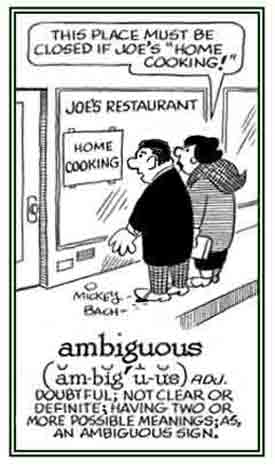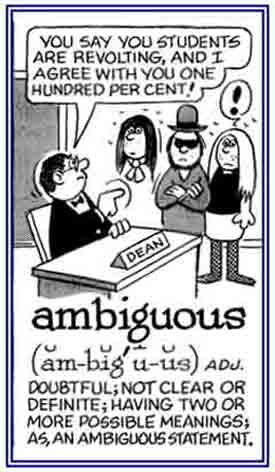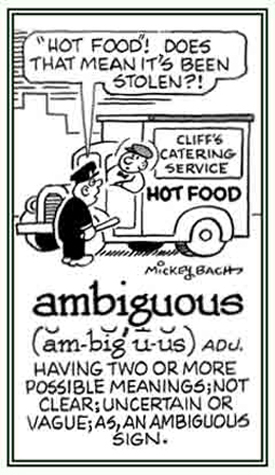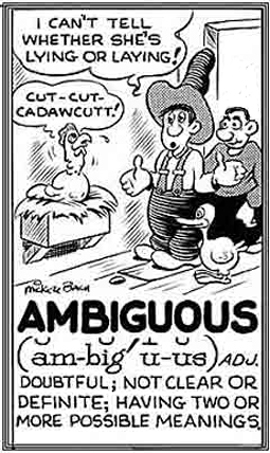ag-, agen-, act-, agi-, agit-
(Latin: to set in motion, to hurry, to shake; to drive; to do, to act; to lead, to conduct, to guide)
agitational (adjective), more agitational, most agitational
1. Descriptive of something or someone that excites and often troubles the mind or feelings of; disturbing: Grace didn't want to read the latest newspaper because of the agitational news and photos of the war.
2. A reference to someone who discusses excitedly and earnestly: When Mr. Hathaway became extremely agitational when he talked to his wife about his sudden financial loses on the stock market.
3. Pertaining to anything that provokes, or stirs up, public discussion of a condition or situation: The agitational protests in front of the city hall were getting out of hand and causing much confusion among the people watching.
2. A reference to someone who discusses excitedly and earnestly: When Mr. Hathaway became extremely agitational when he talked to his wife about his sudden financial loses on the stock market.
3. Pertaining to anything that provokes, or stirs up, public discussion of a condition or situation: The agitational protests in front of the city hall were getting out of hand and causing much confusion among the people watching.
agitative (adjective), more agitative, most agitative
A reference to something causing or tending to cause anger or resentment; provocative: The agitative words in the announcement regarding the delay brought about a lot of aggressive behavior among the people, and they became bitter and hostile as time went on.
1. A person who tries to stir up people in support of a social or political cause: often used in an unfavorable sense: Sometimes in politics, an agitator is one who intentionally excites and animates others about an important or controversial issue and urges them to protest.
2. An apparatus for shaking or stirring: The washing machines in Germany do not have an agitator like in Canada.
2. An apparatus for shaking or stirring: The washing machines in Germany do not have an agitator like in Canada.
agitatorial (adjective), more agitatorial, most agitatorial
1. Relating to that which shakes or moves irregularly: The printer that Jim had shuddered and wobbled in an agitatorial way and produced very bad printouts, and so he had to get it fixed.
2. A reference to anything, or anyone, that strives or tends to excite or endeavors to excite: The articles that Mr. Smith wrote for the newspaper were quite agitatorial, and did not relate much factual information. .
2. A reference to anything, or anyone, that strives or tends to excite or endeavors to excite: The articles that Mr. Smith wrote for the newspaper were quite agitatorial, and did not relate much factual information. .
A female who disturbs or bothers another person or people: In the news, it was reported that a girl in school turned out to be quite an agitatrix who incited others to disobey the teacher and to drink alcohol before school began.
A writing with excessive speed and with unconscious omissions of words and syllables or other elements: Jack suffered from agitographia in that he could only scribble down incomplete sentences the teacher dictated, often leaving out important terms and linguistic units, and wondered later why he couldn't understand what he wrote down!
Hasty writing with an unconscious deletion of words, syllables, or letters: Mary's teacher, Mrs. Smart, told Susan that she would have to improve her agitography so that none of the terms, linguistic, units and letters would be left out in her texts.
Abnormally rapid speech in which words are imperfectly spoken or lost in a sentence: When James was intensely nervous, he suffered from agitolalia, causing the others unable to understand him!
1. Excessively fast speech when some words are not properly spoken or they are missing when a person is talking: Agitophasia can also be described as rapid speech when terms, syllables, and sounds are left out, mumbled, or faulty.
2. Etymology: from Latin agito, "to hurry" + Greek phasis, "speech".
2. Etymology: from Latin agito, "to hurry" + Greek phasis, "speech".
The reaction of the sputum to tests for albumin: The presence of albumin (positive reaction) shown by an albuminoreaction in a clinical test is indicative of pulmonary inflammation.
1. A situation in which something can be understood in more than one way and it is not clear which meaning is intended: The journalist was told by his editor to remove the ambiguities from his article by adding more valid details and to clarify what was going on.
2. An expression or statement that has more than one meaning: There were ambiguities in the diagnosis by the physician regarding Nick's mental condition.
3. That which causes uncertainty or confusion: Because of the nature of the ambiguities of the answers provided by the politician, people were becoming less confident in his qualifications.
2. An expression or statement that has more than one meaning: There were ambiguities in the diagnosis by the physician regarding Nick's mental condition.
3. That which causes uncertainty or confusion: Because of the nature of the ambiguities of the answers provided by the politician, people were becoming less confident in his qualifications.
ambiguous (am BIG yoo uhs) (adjective), more ambiguous, most ambiguous
1. Concerning statements which have several possible meanings or interpretations; equivocal: Mary gave her parents an ambiguous answer instead of a clear explanation as to why she came home so late.
2. Relating to something of a doubtful or uncertain nature; regarding an aspect difficult to comprehend, to distinguish, or to classify: It was clear from Jim's note to his parents that he had left the country, but as to where his destination would be, he was ambiguous.
3. Pertaining to a situation which lacks clearness or definiteness; obscure; indistinct: Ambiguous can refer to a person or the contents in a piece of writing.
4. Etymology: from Latin ambiguus, "having double meanings, shifting, changeable, doubtful"; derived from ambigere, "to dispute about"; literally, "to wander"; from ambi-, "about" + agere, "to drive, to lead, to act".

© ALL rights are reserved.

© ALL rights are reserved.

© ALL rights are reserved.

© ALL rights are reserved.
Go to this Word A Day Revisited Index
2. Relating to something of a doubtful or uncertain nature; regarding an aspect difficult to comprehend, to distinguish, or to classify: It was clear from Jim's note to his parents that he had left the country, but as to where his destination would be, he was ambiguous.
3. Pertaining to a situation which lacks clearness or definiteness; obscure; indistinct: Ambiguous can refer to a person or the contents in a piece of writing.
4. Etymology: from Latin ambiguus, "having double meanings, shifting, changeable, doubtful"; derived from ambigere, "to dispute about"; literally, "to wander"; from ambi-, "about" + agere, "to drive, to lead, to act".
"Ambivalent" refers to people and their attitudes while ambiguous refers to something said or written.




Go to this Word A Day Revisited Index
for a list of additional Mickey Bach illustrations.
Word History
Latin amb-, "about, around," combined with agere, "to drive", formed ambigere, literally, "to drive around, to waver". Out of this word grew the Latin ambiguus, "hesitating, uncertain". English borrowed it as ambiguous, with the meaning "equivocal, capable of being understood in either of two or more possible senses, vague."
ambiguously (adverb), more ambiguously, most ambiguously
1. Characteristic of how something might be understood in two or more possible senses or interpretations: Sandra ambiguously answered the question asked by her mother as to when she would marry her boyfriend because they had not made up their minds on a specific date.
2. Etymology: a descriptive term derived from ambigere, "to dispute about"; literally, "to wander" from ambi-, "about" + agere, "to drive, to lead, to act".
2. Etymology: a descriptive term derived from ambigere, "to dispute about"; literally, "to wander" from ambi-, "about" + agere, "to drive, to lead, to act".
1. The state or quality of being vague, unclear, or being open to many interpretations: The ambiguousness, or uncertainty, of Jack’s answer didn’t help Elizabeth understand why he was looking for a new job.
2. The vagueness of something which makes people hesitant to accept what has been presented by someone: The ambiguousness of the mayor’s plans for the new city hall created a lot of confusion in the minds of the citizens.

2. The vagueness of something which makes people hesitant to accept what has been presented by someone: The ambiguousness of the mayor’s plans for the new city hall created a lot of confusion in the minds of the citizens.
When the speaker used the ambiguousness of "1 + 2 = 3", Mark didn't know if the man meant "one man plus two women", or "one woman plus two men", or "a father, a mother, plus a child", as shown in the illustration below.

Someone who over defines terms and over determines states of affairs out of a compulsive fear of being misunderstood: An ambiguphobe may often say, "Let me make this perfectly clear" or "I want to make very sure that there's no misunderstanding of what I'm saying."


